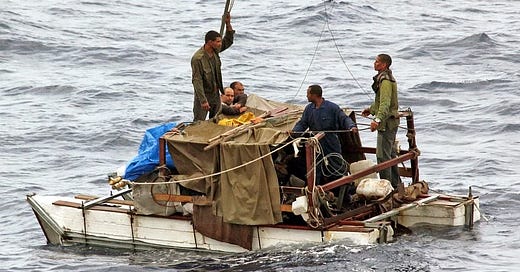A busy area of planning practice over the last year or so has arisen from the exempt change of use of premises to accommodate international migrants displaced by war or seeking asylum. What follows looks at the scale of the issue, the extent of the exemption and likely future developments.
(Paid subscribers can also read my previous post on this subject of 12 August 2024 in the Archive)
Migration
“There can be no doubt but that migration, worldwide and in Ireland and from legitimate points of view, represents a very considerable political challenge. For many reasons, including its potential to engender conflict, it is particularly important that migration is managed in accordance with law.” (Holland J, Croghan v Collins [2024] IEHC 607 §59)
“At the risk of generalisation, the main categories of persons requesting reception provision on arrival in the State are individual applicants for asylum/subsidiary protection, who arrive individually or in family groups, and displaced persons from Ukraine who have arrived way way of mass displacement since the Russian Federation's full-scale war of aggression.” (Humphreys J, McGreal v Minister for Housing (II) [2024] IEHC 690 §14)
“To give effect to national policy regarding the need for additional residential provision for international protection seekers and displaced persons, regulations provide that conversion of hotels and similar residential institutions to accommodate such persons is exempted development...” (Humphreys J, Leitrim CC v Dromaprop Ltd [2024] IEHC 233 §1)
The Scale of the Issue
The (approximate) scale of the issue can be seen from the following;
32,000 applicants for international protection (including 9,000 children) currently accommodated (another 3,000 homeless, overwhelmingly men) with about 30 more arriving each day
30,000 displaced persons currently accommodated (virtually all Ukrainians)
accommodation at 320 premises across the State (including 700 tents)
€1.5bn annual budget for the support of displaced persons and those seeking international protection
Exemption
Section 4 of the Planning and Development Act 2000 (“PDA 2000”) establishes various categories of development exempt from the requirement of planning permission (see also s32(1)(a)). Section 4(2)(a) provides that the Minister may by regulations provide for any class of development to be exempted development for the purposes of the Act.
The Regulations to which s4 and Humphreys J refer are the Planning and Development Regulations 2001 (“PDR 2001” “the Regulations”). The exemptions are set out by “Class” in Part 1 of Schedule 2 PDR 2001.
“Protected persons” are what Humphreys J in Dromaprop colloquially referred to as “'ordinary' asylum seekers” (§24). More fully, “international protection” has the meaning given to it by s2(1) of the International Protection Act 2015 (see Class 20F, Condition and Limitation 7) and “displaced persons” comprise the category defined in Article 2 of EU Council Implementing Decision (EU) 2022/382 of 4 March 2022 (persons displaced from Ukraine on/after 24 February 2022 as a result of the Russian invasion) (see Class 20F Condition and Limitation 6).
Holland J has referred to Class 20F as a "new [2023] class of exempted development in planning law, that is to say, a form of development which does not need planning permission and therefore need not go through the delay, but also and significantly, the public participation processes, required to obtain planning permission. Essentially, the Regulations provide, that...a change of use of many and various types of premises, including hotels, to their temporary use for and [on] behalf of [the Minister] to accommodate or suppport displaced persons or persons seeking international protection is exempted development and so does not require planning permission." (McGreal v Minister for Housing [2024] IEHC 520 §24)
In addition, Class 14(g - i) (2015) renders exempt any “development consisting of a change of use from”;
“use as a hotel, to use as a hostel (other than a hostel where care is provided)” (g) (Care is defined in Art 5, Part 2 PDR 2001. Hostel is not defined but dictionary definitions of “hostel” commonly include reference to short-term, basic, inexpensive accommodation often for a particular group eg travellers, young people, workers etc, the meaning of this provision will be considered in Ampbay Ltd v An Bord Pleanála HC JR 2025/61)
various uses to use as “accommodation for protected persons” (h)
various uses to use as “emergency reception and orientation centre for protected persons” (i)
Extent of Exemption
“It is well established that the exempted development provisions of the Act of 2000 fall to be strictly construed, with any person seeking to place reliance on same having to demonstrate that they clearly come within them.” (Barrett J, Moore v Minister for Arts, Heritage and Gaeltacht [2016] IEHC 150 §565 see also Croghan §20)
The exemptions created by Classes 14 and 20F relate to changes of use, not works (see Dromaprop §68/9 and Croghan §20).
Dependent upon the circumstances of an individual case, it is sometimes possible to find another exemption that will cover at least some required works. In one case in which I advised, for example, the exemption (Class 41(g)) for work “consisting of or incidental to” “remedial works in compliance with” an advisory notice issued under s70H(5) of the Water Services Act 2007 was helpful. More generally, s4(1)(h) PDA 2000 provides that internal alteration to a structure is exempt (see Croghan §21) (although it is arguable that the s4(1)(h) exemption is limited, see Dromaprop §73).
What Next?
The new Programme for Government states that;
Keep reading with a 7-day free trial
Subscribe to Irish Planning and Environmental Law to keep reading this post and get 7 days of free access to the full post archives.




